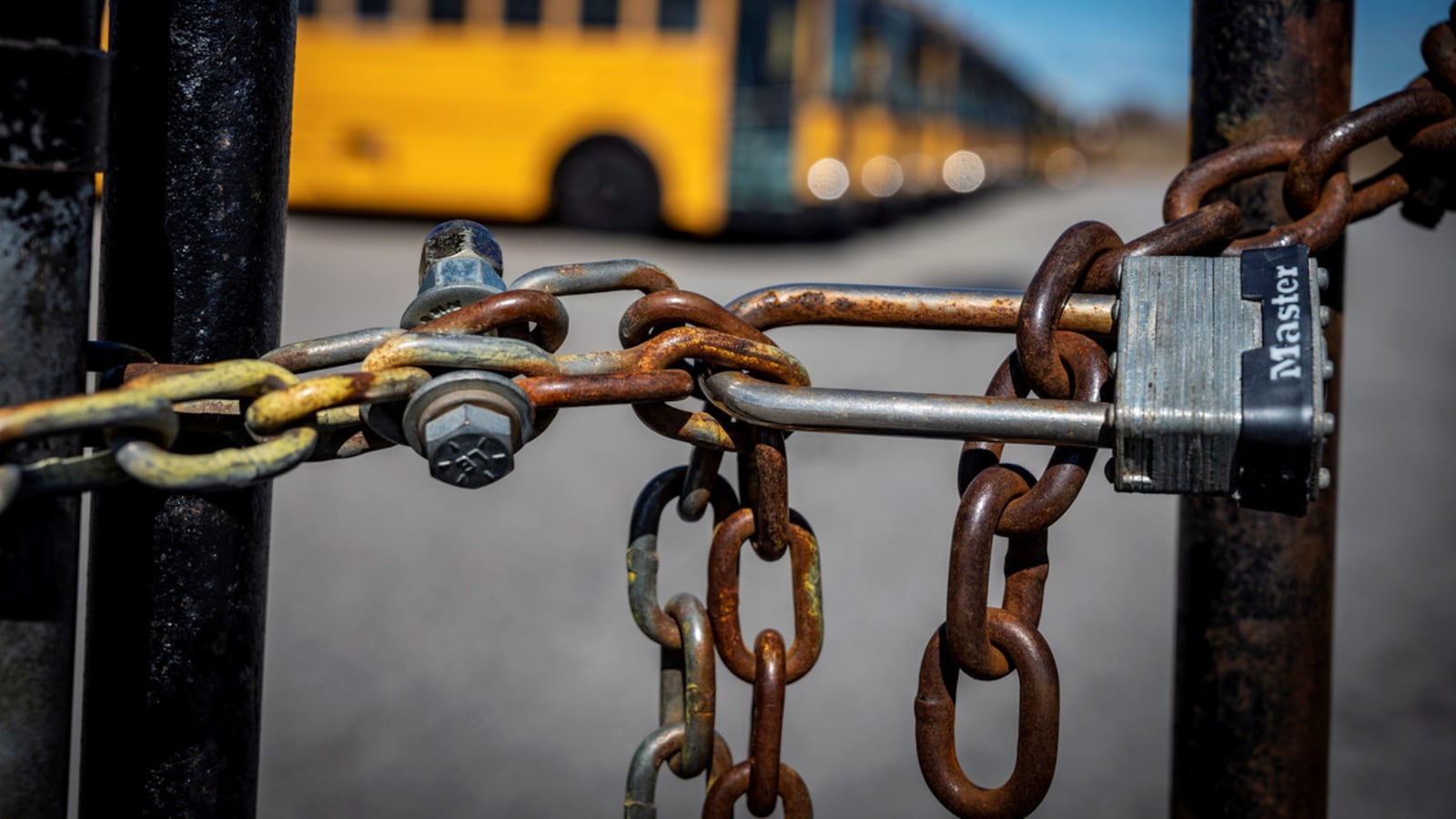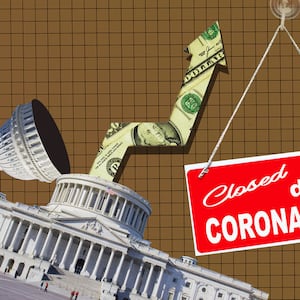A few months ago, Erie County, New York—home to the city of Buffalo—came into the new year with a multi-million dollar budget surplus, just as it’s done every year for most of the last decade. Meanwhile, Nassau County, in suburban Long Island on the other end of the state, had just projected a 2020 budget deficit of nearly $50 million—its smallest projected deficit in years.
Today, however, both counties are in the same bleak situation: staring down budget holes many millions of dollars deep, dreading tough decisions like layoffs, service rollbacks, and tax hikes, and anxiously awaiting more help from Washington, D.C.
The unprecedented scenario created by the coronavirus crisis has rendered each county’s fiscal past basically meaningless. They’re now under siege from both sides of their balance sheets. On one hand, the counties’ main source of revenue—sales tax—is set to dry up as local economies remain shuttered. On the other, the governments are pouring more dollars into services countering the outbreak, like emergency first response and law enforcement.
Both counties received hundred-million dollar sums of federal aid in the $2.2 trillion CARES Act that passed in March. But local officials say that more relief will be needed as long-term economic damage sets in, erasing their budget surpluses or adding to their existing deficits.
The problem for them—and for state, county, and city officials nationwide—is that the issue of state and local government aid has suddenly become the biggest fault line in Washington over coronavirus aid.
Last week, Senate Majority Leader Mitch McConnell (R-KY) set off a furor when he expressed opposition to further aid for state and local governments, and suggested bankruptcy as a possible remedy for struggling jurisdictions. Other GOP lawmakers, such as Sens. Thom Tillis (R-N.C.) and Rick Scott (R-FL), have argued that Washington shouldn’t be bailing out “poorly-run” state and local governments.
That kind of talk infuriates state and local government officials—no matter their party affiliation. As the experiences of Erie and Nassau Counties show, the fiscal pain that local governments are facing is severe, and it’s hitting no matter how well-run a county was perceived to be before COVID-19 struck.
“We’re estimating something on the order of a $300 million loss in revenue,” said Jack Schnirman, the Nassau County Comptroller. “This is unforeseen, catastrophic revenue loss that is solely because of the impact of COVID-19… When you lose a huge part of your revenue, you need help, regardless of how much or little of a surplus, or deficit, or rainy day fund you may have.”
“It’s brutal. I’ve never seen anything like it,” said Stefan Mychajliw, Jr., the top budget official in Erie County. “There’s talk of our revenue loss being close to $200 million,” he said, which is much more than the county’s discretionary budget of $150 million.
“We provide important services that taxpayers actually use—911 dispatchers, parks, libraries,” said Mychajliw. “If we don’t get some semblance of relief, if someone calls 911, no one’s going to answer.”
To county officials, that’s just one reason why the question of sending more aid their way shouldn’t be a question at all. “I wholeheartedly understand the reluctance to bail out states they believe are fiscally mismanaged,” said Mychajliw, who calls himself as “conservative a fiscal Republican” as can be. “We were in phenomenal shape… We shouldn’t be punished at the local level for states’ sins.”
Schnirman, a Democrat, noted New York’s large contribution in tax dollars to the federal government and how hard it’s been for the New York City region in particular to secure aid from Congress, like in the aftermath of Hurricane Sandy in 2012.
“It’s not lost on folks that we’re talking about a region that’s had to scratch and claw to get money,” said Schnirman. “You want to get any New Yorker angry? Say someone in another part of the country thinks we should go bankrupt after we give so much money to the federal government.”
He explains New Yorkers’ attitude toward the rest of the country like this: “Look—we’re there for you, be there for us. How can this be a partisan issue?”
In the CARES Act, at least, state and local government aid was not the partisan issue it is now. Lawmakers and President Trump approved a $150 billion pot of funds to help out those governments.
Erie and Nassau Counties are both populous—each has near or over one million residents—and got $160 million and $236 million, respectively, worth of relief in the CARES legislation. Those funds began arriving last week.
While local officials enthusiastically welcomed that aid, the strings attached to the money limit how helpful it can be. Those dollars have to be spent on COVID-related services, and can’t be used to stem the massive budgetary bleeding on the revenue side of counties’ balance sheets.
Both counties are pushing for Congress to fix that provision. In an April 28 letter sent to McConnell and Democratic leader Chuck Schumer (D-N.Y.), Mychajliw urged “amending the prior legislation that will allow us to use the $160 million in a more flexible manner.”
“Money to offset revenue is critical for a county government that is paying the police, the EMTs, the frontline workers who are dealing with this,” said Schnirman of Nassau County. “As Comptroller, I pay the bills, a $38 million payroll every other week. That’s money in the hands of those folks.”
Advocates for state and local governments were disappointed that additional relief was not approved as part of a $484 billion extension of small business and hospital funds that Trump signed into law last week. In negotiations over that bill, Senate Democrats proposed a measure to allow already-appropriated aid to be used to backfill government revenue loss, but it was rejected.
A spokesperson for McConnell declined to comment on whether the GOP leader would consider amending the CARES Act funds to provide that flexibility, though several GOP senators and President Trump himself have backed the idea in some way.
A spokesperson for Speaker Nancy Pelosi (D-CA) directed The Daily Beast to Pelosi’s statement during a press call yesterday that local governments’ revenue loss “has to be compensated for.”
Negotiations over a next round of coronavirus legislation have not started in earnest. But local governments and their advocates are already trying to put as much pressure as possible on Congress to consider their needs in whatever package they work on next. The National Association of Counties, which represents county governments nationwide, launched on Wednesday a new campaign to pressure Congress to provide more relief.
“We have been strongly advocating for direct and flexible federal funding for county responses to the COVID-19 pandemic and our lost revenue,” said Mary Ann Borgeson, the president of NACo. “These are more than just numbers in a spreadsheet. We are talking about vital services our residents need and the people who deliver them day in and day out.”
Individual counties like Erie have been active in D.C. outreach, too: Mychajliw, for example, said that they have sent over 400 letters to the federal government and Congress pushing for various things since the COVID-19 crisis began.
McConnell has signaled at least a willingness to consider additional state and local government aid, though he said on Wednesday that it would have to be coupled with measures to limit liability for employers and corporations as people return to work amid COVID-19. The idea is generally considered a non-starter by Democrats.
The officials in Erie and Nassau counties say they’re not at risk of flying off a fiscal cliff imminently. On Monday, the Federal Reserve announced an expansion of its program to let counties and cities borrow from a $500 billion fund designed to help them during the coronavirus outbreak. The Fed lowered the population threshold for governments eligible for those loans, allowing both of the New York counties to apply.
That’s welcome news, said Schnirman, and will help Nassau County manage the immediate situation. But the economic disaster hitting counties is so severe—and is poised to be so prolonged—that they believe Congress must act quickly to approve additional relief for the long-term to stave off tough decisions, like laying off government employees, raising taxes on already squeezed residents, or cutting back the law enforcement, health, and transportation services they provide.
The fact that item keeps getting passed on, he said, is not encouraging, and hurts their ability to plan. “If you tell me next time, it’s certain, everyone can take a deep breath, exhale, and plan,” said Schnirman.
“As soon as you hear, we’ll get you next time,” he said, “you wonder, is there really going to be a next time?”







